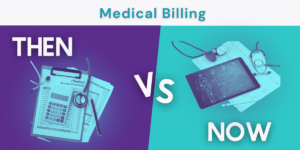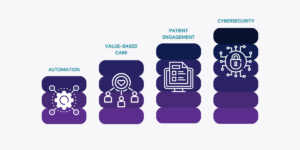Blog

Table of Contents
Medical billing is the process through which health professionals and facilities submit and receive payments from health insurance companies. This process includes medical coding, utilization review, claim management, appeals, benefits verification, and other related services.
Healthcare professionals need reliable medical billing services to streamline the billing process and avoid errors. However, buying medical billing software without complete training and knowledge won’t help your practice. It is essential to entrust this critical task to trained professionals who can ensure the accuracy and efficiency of the billing process.

Medical Billing – Past vs. Now
In the past, medical billing involved a manual and paper-based process that was labor-intensive and prone to errors. The process involved paper claim forms, extensive documentation, and complicated codes that healthcare providers had to navigate to submit claims for reimbursement.
Today, medical billing has evolved into a more sophisticated and automated process, utilizing electronic health records (EHRs) and advanced billing software. EHRs store patient information digitally, allowing healthcare providers to access and update patient records quickly and easily. This integration with billing software enables providers to submit electronic claims to insurance companies with greater accuracy and speed.
Another significant change brought about by modern medical billing is the use of coding systems. In the past, healthcare providers used complex coding systems like the International Classification of Diseases (ICD) and Current Procedural Terminology (CPT) to identify and bill for various medical services. However, modern billing software has made it much easier for healthcare providers to use these codes correctly, reducing the risk of errors and ensuring timely reimbursement.
The Future of Medical Billing – Predictions
Medical billing services will likely continue to play a crucial role in the healthcare industry in the future. As healthcare continues to become more complex, with advancements in technology and changes in regulations, medical billing and coding will become even more important.
One of the key trends driving the growth of medical billing services is the increasing demand for healthcare services. As the population ages and new treatment methods are discovered, there will be more demand for healthcare services, creating a need for medical billing services.
Another trend driving the growth of medical billing services is the increasing use of electronic health records (EHRs). EHRs enable healthcare providers to store and access patient records electronically, which can improve patient care and reduce costs. However, EHRs can be complex to manage, and medical billing services can help healthcare providers navigate the complex billing and coding requirements associated with EHRs.
Overall, the scope of medical billing services will likely continue to grow as healthcare becomes more complex and the demand for healthcare services increases. As such, there will be many opportunities for individuals and companies that offer medical billing services to thrive in the future.

Trends That Can Shape The Future Of Medical Billing
The future of medical billing is likely to be shaped by technological advances, changes in healthcare policies and regulations, and evolving patient needs and expectations. Here are some potential trends that could impact the future of medical billing:
- Automation: Automation and artificial intelligence (AI) will definitely play an increasingly important role in medical billing, as they can streamline many routine tasks and reduce the risk of errors. For example, AI-powered software can help identify coding errors, flag potential fraud and abuse, and automate claim submissions and follow-up.
- Value-Based Care: The shift toward value-based care, where healthcare providers are reimbursed based on patient outcomes rather than the volume of services they provide, could change how medical billing is done. Providers may need to focus more on documenting and measuring outcomes and ensuring their billing practices align with value-based care goals.
- Patient Engagement: As patients become more involved in their care, they may become more interested in understanding and managing their medical bills. This could increase demand for more transparent billing practices and user-friendly billing tools, such as mobile apps and online portals.
- Cybersecurity: With the increasing use of digital systems for medical billing, cybersecurity will become an even more critical concern. Healthcare providers and billing companies must invest in robust security measures to protect patient data and prevent data breaches.
In conclusion, the future of medical billing is likely to involve greater automation, more emphasis on value-based care, and a greater focus on patient engagement and cybersecurity. These trends are not going anywhere and are only expected to grow more.
Hansei Solutions and the Scope of Medical Billing
If you want to know more about the future of medical billing or want to see a demo of our services, contact Hansei Solutions. We are constantly working towards a better future for healthcare, taking your medical practice to an entirely new level. Our medical billing solutions will help you focus better on other important business areas and generate more revenue. We combine technology with strategic partnerships with companies and work towards promoting growth for clients and employees.

Ready to focus on providing healthcare? Let us lighten your load.
We’re here to address your pain points and create growth opportunities for your organization. We’re passionate about what we do, and it shows in every interaction. Learn what makes us tick and schedule a demo today.